 I would like to introduce you to Joel, the second of the Minor Prophets. The only thing we know for sure about Joel, aside from the fact that he wrote this prophecy, is that his father's name was Pethuel (Joel 1:1). Someone has mentioned that God picked an unknown man like Joel to deliver this particular prophecy because the message itself is so important, and He didn't want people dwelling on the one who delivered the message, but on the message itself. Indeed, Joel's prophecy is one that everyone needs to hear and heed. So I want to share with you why I believe that is true. The first thing that may stand out if you read Joel's prophecy is that his main subject seems to be "the day of the Lord". He mentions the day of the Lord six times in three short chapters, and twice he describes it as “great and terrible”. Joel began his prophecy by describing in detail a devastating locust plague that had recently destroyed the land of Judah. He describes what the locusts had done to the fields, the grain, the vineyards, the trees, and how the people had been affected. He saw the locust plague as God's judgment on Judah and called the people to repent. The locust plague, he said, was a warning of greater judgment to come unless the people turn from their sin and return to God with all their hearts (Joel 2:12-13). It won't be enough to just say "sorry", expect God to forgive their sin, and then go on living the same sinful lives, following the ways of the pagan nations and worshiping their gods rather than following and living for the one true God. So Joel grabs the attention of the people, and hopefully our attention as well, by saying this locust plague is just a small taste of the great and terrible day of the Lord that is coming. Then He describes that day. There will be signs in the heavens and the heavens and earth will be shaken. It will be a solemn day of judgment. God will judge all nations (and people) who have denied and defied Him. All those who have made the decision to rebel against Him and refused to repent will be gathered to the "valley of decision" where they will receive God's decision of judgment. But the day of the Lord will also be a day of grace for God’s people. Those who have truly repented of their sin and love and obey God will not be judged but will rejoice in the strength, security, and blessings of God. Many people who read Joel's prophecy get caught up in the drama of the day of the Lord and search the Scriptures to find out more or read books to see what others have to say about it. This is all well and good unless they forget to look for the main point Joel is making. His reason in proclaiming the day of the Lord is to give us the opportunity to make sure we will not be among those being judged on that day. The heart of Joel's prophecy is in Joel 2:12-14, his call to turn to the Lord with all your heart, rend your heart and not your garments, and repent and return to Him. God is gracious and merciful and does not desire that any should perish (2 Peter 3:9), but He is also holy and just. And while He may allow evil to continue for a while, He will not tolerate it forever. The day of the Lord is coming. We don't know when it will be. Joel didn't know. None of the prophets knew. Jesus told His disciples that no one knows except God (Matthew 24:36). The apostle Paul wrote, in his first letter to the Thessalonians that the day of the Lord will come like a thief in the night and take many by surprise (5:2-3). But he also wrote, God did not appoint us to wrath, but to obtain salvation through our Lord Jesus Christ (5:9). Joel, hundreds of years before Paul wrote, told us how to make sure we do not face God’s wrath in judgment. Joel made clear that regret and remorse is not enough when it comes to dealing with sin. Repentance is needed. Joel says repentance is not just throwing out your old clothes and putting on clean ones. God calls for true repentance, which means grieving over your sin, turning to Him and giving Him your heart to cleanse and change so you can love Him, follow Him, and obey Him with every fiber of your being. Repentance begins deep inside us. As I was studying in preparation for writing a new Disciplers study on Joel, I came across these thoughts on the day of the Lord by Jack Wellman (patheos.com): “Today is the best day to repent and be saved if you haven’t already done so, for the Day of the Lord could come today while you’re reading this, tonight in your sleep, or if you were to die, the very next moment of your consciousness.” My prayer is that you will take Joel’s message to heart, and use it, as the writer of Hebrews says, to encourage on another daily, while it is called "Today", lest any of you be hardened through the deceitfulness of sin (3:13). With love, Suzie
0 Comments
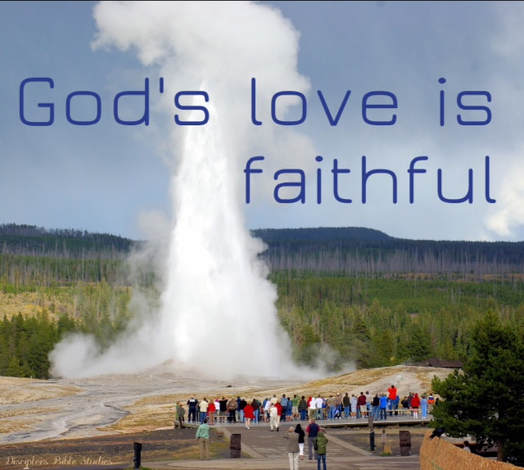 Have you ever read the Minor Prophets, those twelve books of prophecy that are tucked away at the end of the Old Testament? Oftentimes, they are my favorite place to linger in the Bible. But I think the name Minor Prophets is a little misleading because, when you take the time to read what they have to say, you discover they have some major truths to tell and major lessons to teach -- and not just to the Jewish people who were the original recipients. I see this as being especially true of the very first Minor Prophet, Hosea. Hosea is extra special because he did not just speak his prophecy to the people or just write it down. He lived it. And his experiences touch my heart because they tell of God's love. Sometimes we think of God as being so far beyond us that we don’t consider that He may have feelings. We always hear that “God is love”. But we need to remember that if God is love, it means God loves. In fact, the Bible says God loves us. The prophecy of Hosea, through Hosea’s life, illustrates the depth of what that means. Hosea’s story begins when God tells him to go and marry a harlot (prostitute) named Gomer. Hosea obeyed God, He married Gomer, and they had three children together. But then Gomer left Hosea and went back to her old way of life. She degraded and debased herself until she reached the absolute lowest place any woman possibly could. She reminds me in a way of the prodigal son who ended up living and eating with the pigs before he came to his senses and went back home to his father (Luke 15:11-22). But Gomer didn’t go back home - not until God told Hosea to go find her - in her misery, filth, and poverty - and take her back home. And Hosea did. Are you getting the picture? Hosea’s life was a picture of God and His love relationship with His people, Israel. God called them to be His people and He made them a nation. He gave them a land flowing with milk and honey, and was with them always. But Israel was a harlot, just like Gomer. They chased after the gods of the pagan nations. They made their own gods of wood and bronze and gold and worshiped them instead of worshiping the one and only true God who had created the heavens and the earth. Not only that, He had created them and chosen them to be His special people out of all the other peoples on the earth. He loved them and gave them laws to follow so they could fellowship with Him and live happy and productive lives. But they turned their backs on Him because they wanted to be like the pagan nations that surrounded them. So they worshiped the pagan gods and lived lives of sin. How ungrateful can you get? Well, we just might know a bit about that. God has blessed every person on this planet with the beauty and comfort of majestic mountains, verdant valleys, and amber waves of grain. He has given us oceans and rivers and gurgling brooks. He sends the rains in their season and winds to cool us on summer evenings. The sun rises every morning to give light and warmth to our days and the moon and stars sparkle in the night skies. God has given us life itself! But how many people on our planet even acknowledge these things? And its worse for those of us who know Him and have been blessed with His Word and His calling to be His. How often do we ignore Him and go after our own worldly pursuits and break His heart as the Israelites did? The prophecy of Hosea is about the sins of Israel and the extent to which God called Hosea to go to point out and illustrate those sins to them. But even more, the prophecy of Hosea is about the love of God and the anguish it causes Him when His people reject His love, disdain His laws, and embrace the sins of the world. The most beautiful thing about the prophecy of Hosea is the last chapter where we learn that in spite of Israel’s sin and God’s hurt and wrath, He never stops loving His people and promises to restore them in the end. God’s love is faithful in spite of our unfaithfulness. God’s love never fails even when we fail God. The first time I read Hosea and saw the enduring power of God’s love in the face of His people’s sin, my conscience led me re-examine my life, because I don’t want to be like the Israelites who took God for granted, disrespected His laws, and made themselves comfortable in the pagan world. So I asked myself, does my heart follow after my maker or things that are made? Do I live the life of a secular person and then turn to God when when things go wrong and expect Him to be there for me? Is God my treasure? Do I spend quality time with Him, in His Word, or do I fritter away my time on worldly “treasures” that tempt me to fill my day -- things like Facebook, Twitter, movies, politics, gossip with the girls or hanging out with the guys at the gym or bar? What is your favorite pastime? How much time do you spend seeking and listening to God? Thank you, Hosea, for waking me up to see what my unfaithfulness does to the heart of God and how it undermines and brings me down to be a Gomer. Thank you Hosea, for your example of faithfulness to God even though your faithfulness to God fashioned your whole life in a way that brought you hurt and heartache. I want to remember your testimony always and I want it to make me a more thoughtful and intentional person. Like Hosea, God made me and called me for a purpose and I want that very purpose to be fulfilled in my life. He made and called you too and has a particular purpose for you. I hope you will take twenty minutes from your day to read the Book of Hosea with a heart open to God and open to hear what He is saying to you through Hosea’s story. God loves you faithfully, and if you love Him you must be faithful too. with love, ~Suzie 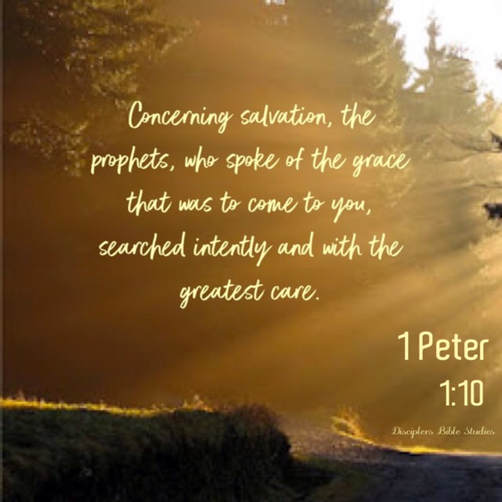 I was raised in a Christian home and always went to church and Sunday School as I was growing up. I knew the old hymns by heart and loved singing them. I also knew many passages of Scripture by heart. But it wasn’t until I was grown with children of my own that the Lord opened my eyes to see the grace and glory of the gospel and opened my heart to believe and surrender to Jesus Christ as my Lord and Savior. It was then that I began to have an hunger for the Word. I just couldn’t get enough. I set my alarm to get up early every morning before my husband and children so I could curl up in a corner by the fireplace and read my Bible. Very soon I began going to Bible study, and I loved learning all I could. For three years I attended Bible study at my church and learned a great deal about the New Testament. I had a curiosity about the Old Testament too, but no one seemed to be interested in teaching that. It wasn’t until I moved with my family to Hawaii, and began attending Bible Study Fellowship, that I finally had a taste of studying the Old Testament. And that opened a whole new world of understanding for me. I knew and had responded to the truth that Jesus Christ, the Son of God, had humbled Himself to come to earth in a perishable human body and had willingly given His life on the cross for our sins. The New Testament taught me that the wages of sin is death (Romans 6:23) and so, to atone for our sins, Christ had to die. And He was the only one who could do that because He was the only sinless human being. But where did all this come from? Why did God make these demands? As I began studying the Old Testament at BSF, I began to get answers to all my questions. I learned how sin had entered the world and how it corrupted the hearts and lives of people. I learned how God had chosen Abraham and his descendants to be His people and to become a nation through whom the whole world would be blessed. I learned how much God hated sin - about His holiness and how men and women, as sinners, cannot stand in His presence. I learned how the people of Israel were called to make animal sacrifices, offering the blood of an animal as a substitute for their own sin and to expiate their sin, “For the life of the flesh is in the blood, and I have given it to you on the altar to make atonement for your souls; for it is the blood by reason of the life that makes atonement” (Leviticus 17:11). I learned how, on the night the Hebrew people were delivered from slavery in Egypt, God had commanded that each family sacrifice a spotless lamb and put the blood on their doorposts. It was the blood of that spotless lamb that saved their firstborn from death and set them free. It was through all this that I came to understand why Jesus is the Lamb of God who takes away the sin of the world (John 1:29). And as I studied the Old Testament, I found there is so much more to help me understand and love God. The Old Testament is a picture of what God was to do for the world in the future. The Old Testament and the prophets all looked ahead to Jesus and what He would do. As to this salvation, the prophets who prophesied of the grace that would come to you made careful searches and inquiries, seeking to know what person or time the Spirit of Christ within them was indicating as He predicted the sufferings of Christ and the glories to follow. It was revealed to them that they were not serving themselves, but you, in these things which now have been announced to you through those who preached the gospel to you by the Holy Spirit sent from heaven—things into which angels long to look (1 Peter 1:10-12). Many Old Testament prophecies even look ahead into our future and beyond. A favorite part of the Old Testament are the Minor Prophets. They are not called “minor” because they are less important, but because they are shorter than the long prophetic books like Ezekiel, and Isaiah. For me, shorter makes them easier to grasp, understand, and apply to my life. I have learned many important truths from the Minor Prophets that have helped me know how to live for God and live a happy and productive life. So in the upcoming weeks, I want to share with you some wonderful truths I have learned from the Minor Prophets. In each of the upcoming posts, I will share from one of the Minor Prophets, beginning with Hosea and working through to Malachi. I hope you will stick with me and take a peek into the lives of those prophets and the timeless truths they had to share. May God give you a hunger for His Word and a heart’s desire to understand it well. I’ll be looking forward to seeing you in two weeks. With love, because God first loved us, ~Suzie 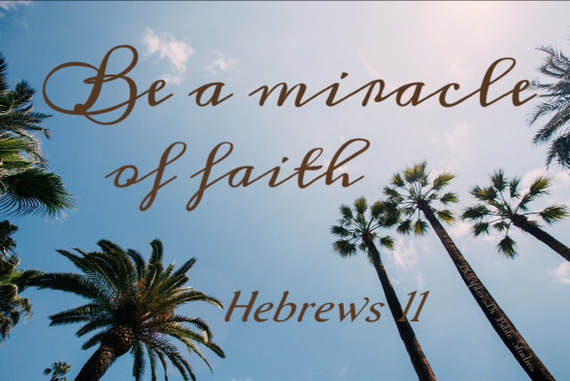 Over the past weeks and months, we have been taking a look at the heroes of faith in Hebrews Chapter 11, and hopefully you have been inspired and encouraged by the men and women honored there. All of those listed in Hebrews 11 are there for one reason: their faith. Their lives were examples of faith that always chooses God, walks with God, trusts Him, obeys Him, overcomes fear, goes forward, keeps on believing, looks to the future, and never gives up. They are men and women who were saved by faith and experienced victory in their lives by faith. It can be a little daunting to read through that Hall of Fame of the faithful, study the lives of those great Old Testament heroes, and then turn and take a look in the mirror at ourselves. Would our lives ever qualify us to be added to the list of Enoch, Noah, Abraham, Sarah, Isaac, Jacob, Joseph, Moses, and Rahab? There were many more too, and some are listed in Hebrews 11:32: Gideon, Barak, Samson, Jephthah, David, Samuel, and the prophets. These were men who by faith conquered kingdoms, performed acts of righteousness, obtained promises, shut the mouths of lions, quenched the power of fire, escaped the edge of the sword, from weakness were made strong, became mighty in war, put foreign armies to fight. And then, if we read and consider the whole Old Testament, many more names come to mind. One in particular comes to my mind, and that is Deborah. Deborah has been my hero since I was a young girl and first heard about her story. If it had not been for Deborah and her faith, the Israelites might have been decimated by the Canaanite armies. Deborah was a prophetess from the tribe of Ephraim. She sat under a palm tree in her yard, and the people of Israel came to her for judgment. One day, perhaps as she sat under her palm tree, the Lord instructed her to call Barak, a military leader from the tribe of Naphtali, and give him the command to take 10,000 men and confront Sisera and the Canaanite army at Mount Tabor. God’s promise to Barak (through Deborah) was “I will draw out to you Sisera, the commander of Jabin’s army, with his chariots and many troops to the river Kishon; and I will give him into your hand.” Barak agreed to go, but he had one condition. Deborah had to go with him. Graciously and with courage, Deborah agreed. So Deborah, Barak, and the ten thousand men went up to Mount Tabor. When Sisera was informed, he gathered nine hundred iron chariots and all of his mighty armies and headed for the confrontation. On the Lord’s chosen day, the day He would lead the way and give victory, He gave Deborah the order to attack, and she relayed it to Barak. So Barak got up, summoned his men, and they went forward to fight. You can read the story of the miraculous battle and how God gave victory that day in Judges Chapter 5. Every single one of Sisera’s army was annihilated. And only Sisera escaped - on foot. As he fled, Sisera came to the tent of Heber who was a Kenite, part a band of desert nomads descended from Moses’ father-in-law. Jael, Heber’s wife was home alone that day, and she came out of her tent and offered Sisera a cup of milk and a place to rest. He went in and received her hospitality. Then Jael took a tent peg and seized a hammer in her hand, and went secretly to him and drove the peg into his temple, and it went through into the ground; for he was sound asleep and exhausted. (Hebrews 4:21). Later in the day, Barak came by in search of Sisera, and Jael showed him the dead body. So the mighty Canaanite army was defeated that day, through faith. The faith actually began with Deborah who had the courage to summon Barak, a military commander, and give him an order in the name of the Lord. The faith that finished the day was the brave act of an itinerant desert woman, Jael. Barak received the recognition in the Book of Hebrews, for after all, he had the faith to follow and obey a woman, God’s prophetess, Deborah. Deborah will always be the hero in my mind. She was a prophetess and a judge, but she was also a simple housewife who sat under a palm tree and dispensed wisdom to those who came to her. I grew up having the vision in my mind of myself sitting under a palm tree and sharing God’s Word with all who would come. It makes me smile to think that in a way I am doing that now, but in a very 21st century way. I live in Hawaii and palm trees grow around my home and I am blessed to sit here at my laptop, which I can take outside under the palms if I like, and share God’s Word with people by writing and by providing Bible study lessons with people all over the world through the ministry of Disciplers. As far as I’m concerned, everything God does is a miracle. The fact that faith could even dwell in my heart, or in any of our hearts, is a miracle. And everything God accomplishes through any of our lives is a miracle of faith. If you haven’t read Hebrews Chapter 11, the Hall of Fame of the faithful, I would encourage you to do so. And dig deeper into God’s Word to find out more about those faithful people. Then be encouraged and find the courage to step out in faith wherever God is calling you. Don’t be afraid to dream big, no matter how young or old you are. We are all miracles of faith. With love ~Suzie P.S. I would also encourage you to read the story of Deborah, Barak, and Jael in Judges 4. And then, go on and read Chapter 5, the song of victory that Deborah and Barak sang together. I know you will be blessed! 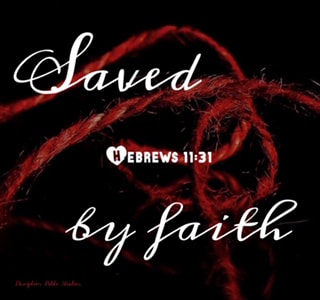 If you’re familiar at all with the Bible, you probably know the story of the battle of Jericho. There was even a song written about it back in 1940 and made popular twenty years later by none other than Elvis Presley. In the September 2nd blog, I wrote about the faith of Joshua and the Israelites obeying God and seeing His mighty power in leveling the walls of that great city. But now let’s look at the battle from the other side - from the side of the people of Jericho, and one person in particular: Rahab. The account of Israel’s marching seven times around the city, then blowing the rams horns and shouting, and experiencing victory by the miracle of God, is exciting, encouraging, and inspiring. But the story of Rahab is marvelous and indeed miraculous. It is the story of one woman, living in the midst of a sinful city, and living a life of sin. But the beauty and power of the story lies in her faith - her simple, unassuming, courageous, active, obedient, patient, saving faith in God. So lets get to know Rahab. Rahab lived as a prostitute in a house that was built into the massive wall that surrounded the great pagan city of Jericho. The people of that city had been hearing about the Israelites ever since they left Egypt and crossed the Red Sea on dry ground, leaving the Egyptian army drowned in their wake. They had heard how the Israelites had overcome and destroyed the great armies of Og, king of Bashan and Sihon, king of the Amorites. And when they learned the Israelites were camped just across the Jordan River, fear filled their hearts. Rahab was afraid too, but unlike the rest of that sinful city, Rahab decided to align herself with the God of Israel rather than cling to the immoral and pagan ways of the city she called home. So when Joshua sent two men to spy out the city, Rahab invited them into her home and provided them with shelter and protection. She also gave them vital information to take back to Joshua, “I know that the Lord has given you the land, and that the terror of you has fallen on us, and that all the inhabitants of the land have melted away before you…..and no courage remained in any man any longer because of you; for the Lord your God, He is God in heaven above and on earth beneath” (Joshua 2:9, 11). When the king of Jericho heard there were Israelite spies in the city, he sent men to search for them. They were directed to Rahab’s house, but she did not give them up. Instead, she hid them and sent the king’s men off on a wild goose chase in search of them. When night fell and the city gates were closed, Rahab helped the spies escape by letting them down by a rope through her window on the city wall. She also gave them instructions on where to go to avoid the king’s men. But before they left, Rahab asked the spies to spare her life and the lives of those in her family when they came back to take the city of Jericho. The spies agreed and gave her a red cord to tie in her window. The cord would identify Rahab’s house and the Israelites would not harm her. Rahab was to gather all of her family into her home and all who were inside would be saved on the day of destruction. She agreed. And then she waited. She waited through the days it took for the spies to return to Joshua. She waited through the days it took for the Israelites to prepare and then cross the Jordan River. She waited through the days when Joshua circumcised all the men of Israel who had not been circumcised during the march in the wilderness. She waited, looking out through her window at the encampment of Israel spread across the plains around Jericho. She waited six more days as the people of Israel marched once daily around Jericho in silence. She waited and her faith endured. Then, after completing their march around Jericho on the seventh day, the priests blew the trumpets, and the people shouted, and the walls of the city fell down flat. There was nothing left except one house on the wall with a red cord hanging in the window. It was Rahab’s house, a house of faith. God judged the sinners but He spared those who believed in Him. The red cord in the window was a symbol of Rahab’s faith. Do you remember, on the night God led the people of Israel out of Egypt? They had painted the blood of a lamb on their doorposts to avert the angel of death and to spare their firstborn. That blood was the sign of their faith, the sign that they believed God would do what He had promised. In the same way, Rahab’s red cord proclaimed her faith in God. That red blood and the red cord also look ahead to the shed blood of Jesus Christ, the only thing that cleanses and saves us. God’s grand plan of redemption, like a scarlet cord runs through the entire Bible. The story of Rahab in the book of Joshua ends with these words: However, Rahab the harlot and her father’s household and all she had, Joshua spared; and she has lived in the midst of Israel to this day, for she hid the messengers whom Joshua sent to spy out Jericho. (Joshua 6:25). But that is not the end of her story. Rahab became a part of the people of Israel, marrying Salmon, from the tribe of Judah (perhaps one of the spies). She gave birth to a son, Boaz, who married Ruth the Moabitess who gave birth to Obed, the father of Jesse, the father of king David: the line of Jesus Christ (Matthew 1). And that is the marvelous part of this story. It was not only Rahab’s life that was saved through faith - her soul was saved too. She became, not just a part of the nation of Israel, but a part of the family of God - by faith. Rahab's was a simple faith in God, tested by helping the spies, waiting patiently for God’s timing, and obeying the simple command to hang the red cord in her window. Through faith Rahab's life testifies to that scarlet cord of redemption Rahab's exemplary faith in God is recorded in His Word and she is cited among the heroes of faith in the Book of Hebrews. By faith Rahab the harlot did not perish along with those who were disobedient, after she had welcomed the spies in peace (Hebrews 11:21). May God bless you with faith like Rahab’s ~Suzie 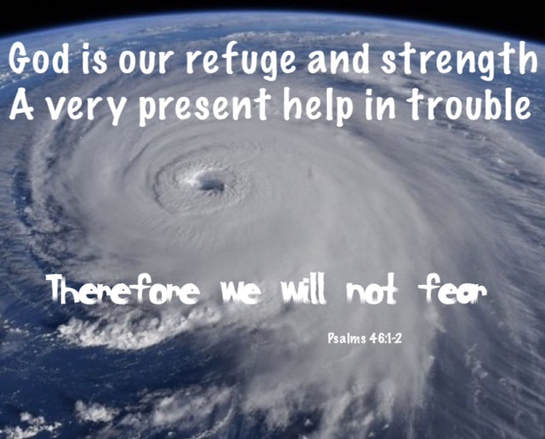 Hurricanes are scary! I don’t think anyone would deny that. And no matter how many you may have lived through, I don’t think you ever feel at ease when you hear one is headed your way. I’ve lived through four hurricanes. At lease I’ve had to prepare for four. My husband and I, our four children, and our dog lived in Hawaii, on the island of Oahu, in 1982 when Category 1 hurricane Iwa passed by our island, producing sixteen foot waves and wind gusts up to 120 miles per hour. I remember our family huddled together through the night in our family room and listening to the wind howling through the trees. The next morning all was calm, but downed trees and debris littered the streets and every yard. In September 2005, I was alone with my two dogs in Houston, Texas. My husband had gone to be with the Lord and my children were grown, with families of their own. Hurricane Rita, the strongest storm ever observed in the Gulf of Mexico, was bearing down on East Texas. She made landfall on September 24 as a Category 3 hurricane. That night I huddled with two furry bodies and watched the rain on the window and shadows on the wall as trees blew and bent precariously in the wind. I guess I should have been glad to see those shadows because it meant the street lights were still on - we hadn’t lost power. But in the morning the streets were blocked with toppled trees, making it impossible to leave the neighborhood. There was nowhere to go anyway. Everything was closed. Store shelves were bare, gas stations were out of gas, banks were closed, and the freeways were still jammed with cars that had been trying to evacuate the day before - the worst traffic jam in Houston history. Recently, back in Hawaii, on the island of Oahu, I prepared for hurricanes Lane and Olivia. It was scary. Our house is perched on a hillside above Waikiki. It’s an old house, single-wall construction, built in the 1950’s, and it can get pretty windy up here even when there is no storm. Hurricane Lane, forecast to head straight for Oahu, dumped over fifty inches of rain on the Big Island of Hawaii, but then fizzled to a tropical storm and turned west as she came close to our island. An answer to prayer! Then, this past week, hurricane Olivia, moving north of us and forecast to turn west toward our island, ended up centering her fury on Maui and Molokai. Again Oahu escaped with mostly inconsequential winds and rains. But as Olivia passed through our islands, a monster storm was brewing in the Atlantic Ocean. Hurricane Florence, which grew to be a massive Category 5 storm, 400 miles in diameter, was forecast to make landfall on the coast on North Carolina. There are over fifty Disciplers Bible Studies classes in the state of North Carolina, and many of those class leaders I know and love through corresponding over the years by email and phone calls. My heart has been heavy as I have prayed for them all, beseeching God to hush the storm and protect the people so helpless against the forecast violent winds, storm surge, and torrents of rain. Our Disciplers prayer team has been faithfully praying too, along with those in the North Carolina classes. Florence made landfall on Friday as a Category 1 storm. You’ve probably read about it or seen it on the news. I’ve been watching for updates, watching for God’s answers to prayer. One meteorologist was explaining how hurricanes work - what drives them - and he said the winds control the hurricane. That made sense to me because the winds are so strong, but the meteorologist didn’t say anything about what controls the winds. Well, I know the One who controls the winds and I hope you know Him too. The scientists with all their degrees, the smartest and most experienced meteorologists, the most popular newscasters - none of them can do a single thing to control the wind of a hurricane. They can predict the path, report the intensity, deliver the news of the destruction, but they can do nothing to control a single thing about the hurricane. But the One who created the heavens and the earth and upholds all things by the word of His power (Hebrews 1:3), can rebuke the wind, and tell the sea to “Hush, be still” (Mark 4:39) and they obey! The voice of the Lord is powerful, the voice of the Lord is majestic. The voice of the Lord breaks the cedars;…hews out flames of fire….shakes the wilderness…..and makes the deer to calve. And in His temple everything says “Glory!" (Psalm 29). If you’re living through a storm and your heart is fearful, take time to read Job 38-41 where God speaks to Job out of the whirlwind (38:1) and out of the storm (40:46) giving Job a lesson on His mighty power: God tells Job that He “laid the foundation of the earth and set the boundary for the seas. He knows all the deep things of the earth and the very source of light and darkness. He brings the rain and makes the grass grow. He is the source of all wisdom and understanding. He made the animals, each one unique: some swift, some strong and powerful, some stupid, and some majestic and brave. Some He made too powerful for man to tame. But God cares for them all, knows when they give birth, and provides them with food. God thunders with His voice wondrously, doing great things which we cannot comprehend (Job 37:5). He disperses the cloud of His lightning. It changes direction, turning around by His guidance, that it may do whatever He commands on the face of the inhabited earth (Job 37:11-12). And as believers in His Son, our Lord Jesus Christ, He is the One we turn to in the storm - with our fears, our uncertainties, our needs, and our desires. We at Disciplers have been praying, along with those who are being affected by hurricane Florence, since last week when she was a Category 5 hurricane out in the Atlantic. We have prayed that God would speak “Hush” to the storm and calm her winds, calm the seas, calm hearts, and keep people safe. I have received notes from two sisters in Christ who have been faithfully praying, and I would like to share with you what they say. Both are in Raleigh, NC., experiencing Florence right now as I write. The first is a leader in the Saltshakers class at Christ Baptist Church. She also leads a small Disciplers group in the hills of Virginia. Here’s what she said on Friday after Florence made landfall and was moving inland toward Raleigh. “Our God is hearing all our prayers!!!!!! Florence is now down to 90mph! Category 1! (They have been saying it would land at a cat 4, then cat 3 then 2 now it’s already down to 1! God’s answer. His miracle!!!) Praying He says it again, “Peace, Be still!!!” The second is from a leader of Shepherd’s Heart Prison Ministry in Raleigh. “Thank you for encouraging and praying for us. You and your prayer team are part of the goodness of the Lord in the land of the living (from Psalm 27). And now, it is amazing that what you prayed for us has actually taken place. There appears to be a shield around Raleigh! Although we are receiving rain and wind, so far, it looks as though it is so much less than expected. We are hunkered down and still have electricity.” We continue to pray for and with those who are in this storm, especially for those who have been gravely affected and are grieving the loss of their homes, property, and even loss of loved ones. We are praying for those who have experienced some of the worst of the storm in Wilmington, New Bern, and Myrtle Beach - especially for those who chose to stay home. We are praying for those who remain in harms way - for their safety and that they would turn to our all-powerful God for peace and protection. Only He can control the storm. Our part is to humble ourselves and ask, for He is our refuge and strength; a very present help in trouble! May He bless you with peace and safety, Suzie 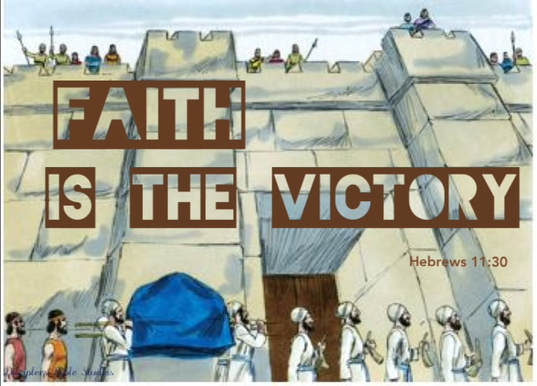 By faith the walls of Jericho fell down after they had been encircled for seven days. (Hebrews 11:30) Forty years after the Israelites marched out of Egypt and escaped to freedom through God’s parting of the Red Sea, they crossed the Jordan River into the Promised Land. But every person who had been twenty years old or more at the time of the Exodus had died on the journey -- except for two men. Moses did not enter the Promised Land either. At the end of his life, Moses was led by God to the top of Mount Nebo where he looked out and saw the Promised Land spread before him. Then, at the age of one hundred and twenty years, he died. Only two men remained from the Exodus generation, Joshua and Caleb, and they lived to make the journey because of their faithfulness. (You can read about this in Numbers 13 -14.) Joshua led the new generation across the Jordan River and into the Promised Land. The river was the first obstacle he faced as the new leader of the Israelite people. By faith he carried out his task, and would now face his second obstacle: the imposing walled city of Jericho. God gave Joshua clear instructions for taking the city, but this was to be a strange sort of battle. “See, I have given Jericho into your hand, with its king and the valiant warriors. You shall march around the city, all the men of war circling the city once. You shall do so for six days. Also seven priests shall carry seven trumpets of rams’ horns before the ark; then on the seventh day you shall march around the city seven times, and the priests shall blow the trumpets. It shall be that when they make a long blast with the ram’s horn, and when you hear the sound of the trumpet, all the people shall shout with a great shout; and the wall of the city will fall down flat, and the people will go up every man straight ahead” (Joshua 6:2-5). Joshua faithfully relayed God’s instructions to the priests and the people and then gave the order, “Go forward and march around the city…” (Joshua 6:7). By faith, every person obeyed Joshua. The people marched silently around the city of Jericho once a day for six days. You can imagine the heckling, insults, and ridicule they endured from the people of Jericho who felt safe and secure looking out over the imposing walls of their city. But the people of Israel marched on, in silence, by faith. All those who marched had been teenagers or younger when they left Egypt. Some had not been born yet, but they knew how God had brought their families out of slavery and they had experienced His miracles while marching through the wilderness. They had miraculously crossed through the Jordan River into the land God had promised to their Patriarchs: Abraham, Isaac, and Jacob, and now they faced their first challenge in taking the land as their own. Perhaps it was not quite what they expected. Marching silently around the city walls was definitely unconventional and probably felt a little weird and uncomfortable, maybe even an impractical gesture to some. But they obeyed God - they obeyed Joshua’s command. And on the seventh day they got up early in the morning and marched in silence around the walls of Jericho, not just once but seven times. On the seventh time, the priests blew the trumpets and every person shouted as loud as they could. And the walls of Jericho fell down flat (Joshua 6:20). Joshua and the people marched by faith for seven days and then watched God accomplish the impossible. They showed their faith through obedience to God and His word, and victory was theirs. The Scripture gives us many verses that cite the importance of obedience to God.* It is through obedience that we give feet to our faith and march ahead each day of our Christian lives, even when it's hard work, even though we may be tired, and even though there may be some who ridicule us and put us down and victory seems impossible. It is through obedient faith that victory comes. And victory will not come without it. As we get up out of bed each morning and put our feet on the ground, let’s remember to use our feet to follow God in obedience wherever and however He calls us. Let’s pray for ourselves and for each other to have faith as courageous and committed as Joshua and the people of Israel. For “faith is the victory that overcomes the world. His banner over us is love, Our sword the Word of God; We tread the road the saints above With shouts of triumph trod. By faith, they like a whirlwind’s breath, Swept on o’er every field; The faith by which they conquered death Is still our shining shield” (John H. Yates, 1891). with love in Christ ~Suzie *Here are a few of my favorite verses about obedience. Exodus 19:5 - Now then, if you will indeed obey My voice and keep My covenant, then you shall be My own possession among all the peoples, for all the earth is Mine. Deuteronomy 11:1 - You shall therefore love the Lord your God, and always keep His charge, His statutes, His ordinances, and His commandments. Luke 11:28 - ….Blessed are those who hear the word of God and observe it. John 14:15 - "If you love Me, you will keep My commandments." Hebrews 13:17 - Obey your leaders and submit to them, for they keep watch over your souls as those who will give an account. Revelation 14:12 - Here is the perseverance of the saints who keep the commandments of God and their faith in Jesus. 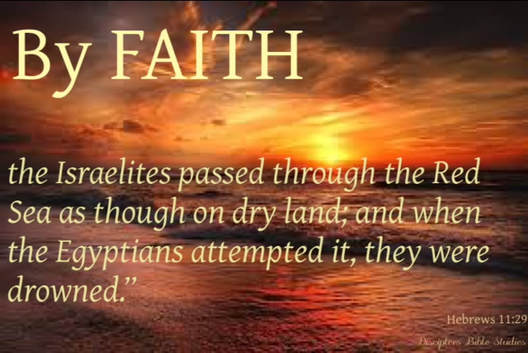 We read in Exodus 13:14 that the Lord God led the Israelites out of Egypt from the house of slavery by His mighty power. Pharaoh had finally relented after the land of Egypt had been destroyed by ten terrible plagues and the firstborn in every family was dead. The Hebrew slaves marched out of Egypt as a free people, the seed of the nation of Israel. The Lord was with them, leading them visibly with a pillar of cloud by day and a pillar of fire by night (Exodus 13:21). But then Pharaoh’s heart was hardened again. He regretted that he had let the people go, and he sent his army, with all his horses and chariots, after them. As the Israelites followed God through the wilderness by the Red Sea, they turned around to see Pharaoh’s army pursuing them, and fear filled their hearts. They cried out to the Lord (Hebrews 14:10) and turned upon Moses, blaming him for their plight. They wished to be back in Egypt rather than face the fury of Pharaoh’s armies. Moses spoke calmly to the people, “Do not fear! Stand by and see the salvation of the Lord which He will accomplish for you today; for the Egyptians whom you have seen today, you will never see them again forever. The Lord will fight for you while you keep silent." Then the Lord gave the command for the people to go forward (Exodus 14-15). Ahead of them was the Red Sea, and behind them was the Egyptian army. The people were probably terrified. I’m sure I would have been. What about you? But they stood and watched as Moses lifted his staff and stretched out his hand over the sea. They watched as a strong wind came and swept back the sea, dividing the waters. All night long that wind blew, dividing the waters and providing a pathway of dry land. By faith, but surely with some fear in their hearts, the Israelites stepped forward and marched across the dry seabed between walls of water on both sides. Then the Egyptians began to follow. But God caused their chariot wheels to swerve making driving difficult and throwing the horses and army into confusion. The Egyptians realized it was God fighting against them (Exodus 14:25) and they turned around to flee to safety. But as the last Israelite stepped out onto the far bank of the sea, Moses again raised his staff and the waters returned to their place, drowning the entire Egyptian army. The Lord overthrew the Egyptians in the midst of the sea (Exodus 14:27). The Lord saved Israel that day and all the people feared the Lord, and they believed (Exodus 14:30-31). About fifteen hundred years later, an unknown person of faith wrote a letter to encourage Jewish Christians. In that letter, the writer held up Moses and the people of Israel as examples of faith: by faith they passed through the Red Sea as though they were passing through dry land; and the Egyptians, when they attempted it, were drowned (Hebews 11:29). Today we read this letter in God’s Word and are encouraged by their example. I wonder how many lives the example of Moses and the Israelites has touched through the years. How many people have read the story of the Israelites marching through the Red Sea and been encouraged in their faith? When I consider what they faced, I am encouraged to go forward and follow God even when I feel afraid. When the world is threatening me on the other side, I am encouraged to stand up straight and walk forward wherever the Lord leads me. Sometimes, like the Israelites, we don’t really seem to have a choice, and in those times we can lay down our fear and know that we follow the God who saves. And as we follow Him in faith, He will never let us down. And like the Israelites, when the enemy assails, doubts plague, and unbelievers attack us, we need not say a word. We need only to obey, knowing that the Lord is fighting for us. ~with love, Suzie 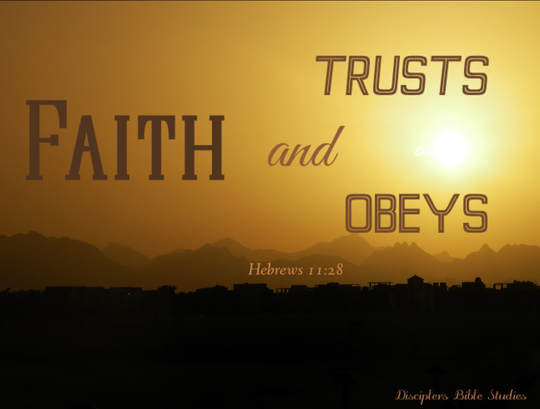 God called Moses to lead the Hebrew people out of slavery in Egypt, and although Moses had felt inadequate and had protested, in the end his faith overcame fear and he obeyed God. With his brother, Aaron, Moses confronted Pharaoh nine times with God’s command to let the people go. Nine times Pharaoh had refused, mocked God, and hardened his heart. But Moses remained faithful. After each of Pharaoh’s refusals, God had sent a plague upon Egypt, but Pharaoh never relented. The Egyptians and the Hebrew people saw God’s almighty power in turning the Nile River to blood and sending plagues upon the land of Egypt. Everyone in the land of Egypt had experienced the pollution of the Nile, and plagues of frogs, gnats, boils, and locusts. But God had set apart and spared the land of Goshen, where the Hebrew people lived, from the plagues of insect swarms, death of livestock, hail, and darkness. Through nine plagues, God had kept His people safe as they watched the destruction of Egypt and the misery of the Egyptian people. Moses had been faithful in presenting God’s command to the increasingly furious and hardened Pharaoh. And finally God would send the tenth plague - the death of the firstborn son of every family in the land of Egypt. Moses gave fair warning to Pharaoh of what would was to come. According to God’s command, he warned the Hebrew people as well. To escape this tenth and final plague and their life of slavery in Egypt, they all had to obey God’s explicit commands concerning the Lord’s Passover (Exodus 12:11). Each family was called to demonstrate their faith with obedience by taking an unblemished lamb, a year old, and killing it at twilight on the fourteenth day of the month. Each family was to take some of the blood of the lamb and put it on the doorposts and lintel of their house. Then they were to roast the lamb over a fire and eat it with unleavened bread and bitter herbs. No one was to leave their home that night, but they were to be dressed and prepared to exodus Egypt. Exodus 12:13 records that when the people heard God’s commands, they bowed and worshiped, and they went home and obeyed. At midnight on the fourteenth day of the month, the angel of death passed over the land of Egypt and the firstborn son of every family died, except in the houses with the blood on the doorposts and lintel. There was loud mourning in Pharaoh's palace and in every home, except in the homes of those who obeyed God by faith. By faith Moses [and the people] kept the Passover and the sprinkling of blood, lest he who destroyed the firstborn should touch them (Hebrews 11:28). Moses and God’s people demonstrated their faith by believing God’s judgment would come, just as He said. They demonstrated their faith by doing just what God had told them to do. And they demonstrated their faith by trusting that through the Passover, God would save them from the angel of death and deliver them from Egypt. This is a profound lesson in faith for God’s people today, and it is also a beautiful picture of redemption -- a picture in which we can place ourselves through faith. Knowing that you were not redeemed with perishable things like silver and gold from your futile way of life…..but with precious blood, as of a lamb, unblemished and spotless, the blood of Christ (1 Peter 1:18-19). We who are redeemed by the blood of the Lamb are redeemed by faith -- faith that believes God’s warnings of judgment given in His Word, faith that obeys what God commands in His Word, and faith that trusts in His promises of salvation and eternal life. The Hebrew people were saved by God's grace through faith and so are we. If you are a believer, you are to live by faith, as Moses and those Hebrew slaves in Egypt did thousands of years ago. Sometimes life is hard and sometimes obedience is hard - especially when it makes us stand out from the crowd as strange and different. But faith in God will always see us through because his promises are real and true and unchanging. We can count on God. We can trust Him. We can cling to Him. With love, Suzie 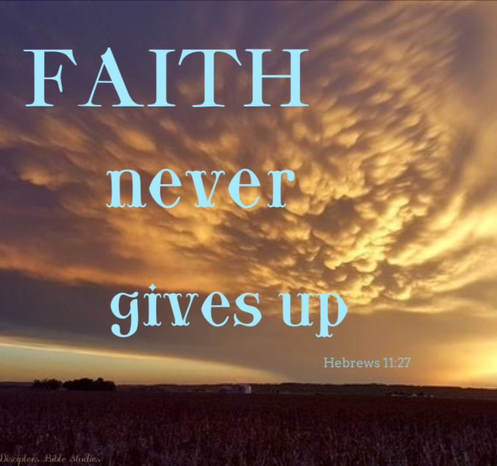 By faith Moses left Egypt, not fearing the wrath of the king; for he endured, as seeing Him who is unseen (Hebrews 11:27). Four hundred years had passed since the Hebrew people had moved to Egypt to seek relief from famine and reunite with Joseph. At the time, they were welcomed by the Pharaoh and honored as the family of Joseph, who had been appointed to the most powerful position in Egypt (Genesis 41:33). But four hundred years later Joseph was dead and the new Pharaoh did not remember Joseph at all. In fact, the new Pharaoh had come to fear that the rapidly growing Hebrew population would soon outnumber the Egyptians. He had relegated the Hebrews to heavy labor and in their misery they called out to God for relief. God heard their cries and raised up Moses to lead the Hebrew people to freedom. But it would not be an easy task for Moses. His faith and endurance were tested over and over again, but Moses obeyed God and took his stand before Pharaoh. He did not allow himself to be overcome by the power of Pharaoh or circumstances surrounding him, but rather looked to God and trusted Him to keep His promises (see Genesis 46:1-4). Have you ever taken a stand for something you knew was right and then met opposition on every side? If you have, then you have had a taste of how Moses must have felt when he followed God's command to confront Pharaoh and demand he let the Hebrew people go. Repeatedly, in spite of God sending nine plagues upon Egypt, Pharaoh continued to harden his heart; he mocked God and refused Moses’ requests to let the people leave. Not only that, Pharaoh retaliated by placing an increasingly heavy burden upon the Hebrew people - so they turned against Moses too (Exodus 5). A few months ago, I wrote a letter to my state senators urging them to support a certain upcoming bill. I knew that Biblically I was right in my position, and I felt compelled in my heart to write. A few weeks later I received a form letter from one of the senators. I received no response at all from the other senator, and it was obvious from the form letter that my letter had never been read. When I shared this with a couple of friends, I discovered that their views radically conflicted with mine. To me, this did not make a difference in our friendship, but it did to them. I no longer hear from them. It made me understand in a small way how Moses must have felt, and that encouraged me to continue to stand up for my moral, godly convictions even when it is unpopular and uncomfortable. When Moses faced opposition, he didn't buckle under pressure from power or people. By faith, he kept right on doing what God had called him to do. He kept right on pressing on for what he knew was God's will. He endured. He never gave up, even when it was hard and lonely. Moses obeyed God rather than give in to Pharaoh and the pressure of his own people. Ten times Moses went before Pharaoh to demand that he let the people go, and finally after the tenth time and God's tenth plague upon Egypt, hard-hearted, angry Pharaoh relented and let the people go. Because Moses had faith in God and never gave up, the Hebrew people marched out of Egypt as a free people, no longer slaves but as the seedling nation of Israel. Of course, Pharaoh had a change of heart soon after, and that led to another crisis for Moses, but Moses pressed on. The lesson for us as Christians is that we need to take the faith of Moses to heart. His boldness, courage, and endurance should be an encouragement and inspiration to us. God's Word calls us to stand for what is good and true and right, and we need to obey His Word by faith - all the time. Like Moses, we need to endure, even in the face of adversity, and never give up. And when Christian leaders stand up for the Word of God, we need to support them. We need to read and study and meditate on God's Word until it becomes a part of us, until it becomes a compulsion within us to obey and stand up for Biblical principles in an increasingly secular world. Will you embrace God's Word with me? Will you read and study the Bible daily so it can sink into your heart and mind and become a part of you? Christians should stand together as God's people for what is good and right and true. Moses did and God was with him. God never let him down. He is with us too, when we are with Him. Like Moses, we need to endure, keeping our eyes, not on the circumstances but on Him who is unseen. with love, Suzie |
SUZIE KLEIN
I have been involved in Disciplers since 1987, as a discussion leader, teacher, writer, and now as director. I am profoundly committed to the stewardship of this ministry which God has entrusted to me for a time. God’s word is the chief joy of my life. I cherish my personal time in the word, and I am filled with gratitude to be able to share His word with you, my fellow disciples in Christ. Categories |

 RSS Feed
RSS Feed